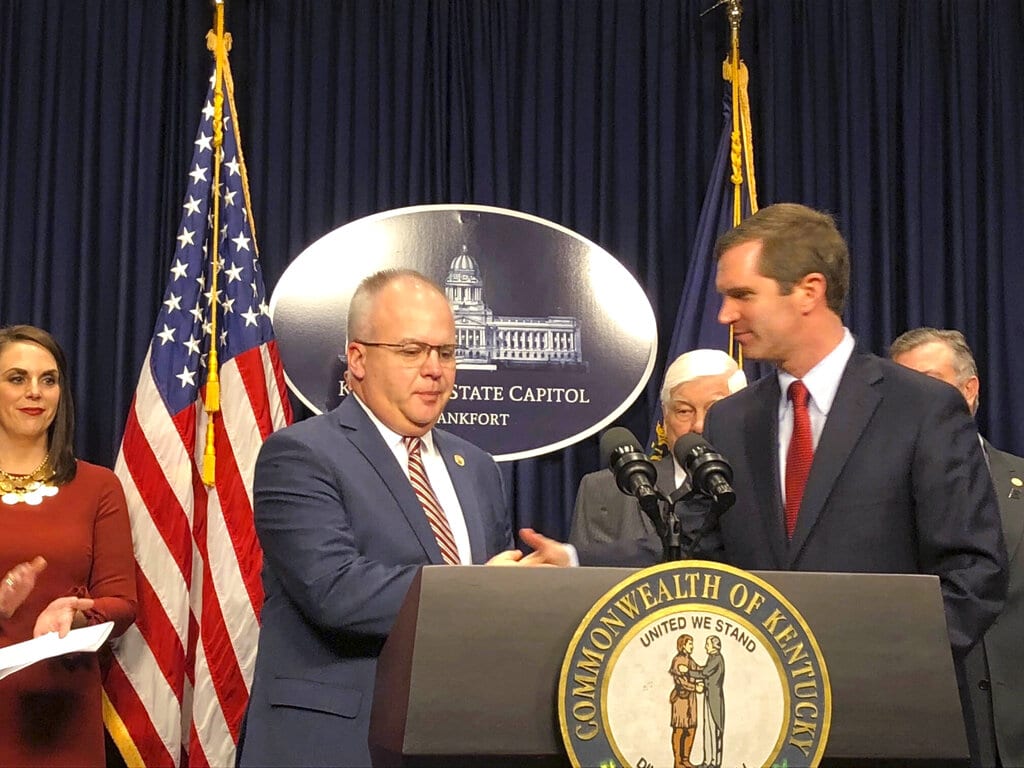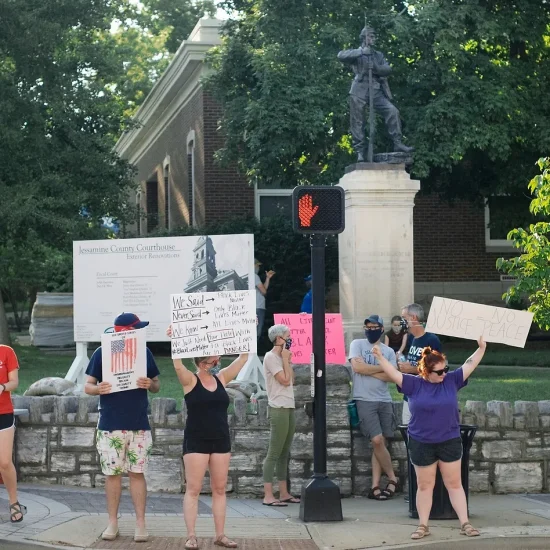

Kentucky Gov. Andy Beshear, right, and Republican state Rep. Adam Koenig, left, teamed up at a press conference on Thursday, Feb. 6, 2020, in Frankfort, Ky., to push for passage of a bill to legalize sports betting in Kentucky. The proposal cleared a House committee in mid-January but has been awaiting a vote in the full House since then. (AP Photo/ Bruce Schreiner)
FRANKFORT, Ky. (AP) — In a state where betting on the Kentucky Derby is seen as a rite of passage, efforts to legalize wagering on other sports have barely gotten out of the starting gate.
A bill to allow wagering on sports other than horse racing has exposed tensions among Republicans who control the legislature, spotlighting a divide between Christian conservatives who oppose it for religious reasons and lawmakers who see the potential for a new revenue source.
The bill sailed through a legislative committee nearly a month ago but has languished in the full House since then while awaiting a vote. House Speaker David Osborne has repeatedly said the legislation is being discussed internally by Republican lawmakers while acknowledging that gambling remains a “very divisive” issue that evokes strong emotions.
Those divisions were on display Thursday. In a House speech, Republican Rep. Chris Fugate denounced gambling on moral grounds.
“Gambling is not the answer,” the eastern Kentucky lawmaker said. “If you think about when we depend on the people of our districts to lose money so the state can gain money, it’s not biblical first of all. It’s against the Bible. It’s morally wrong.”
In the Senate, where Republican leaders typically present a united front publicly, leading GOP lawmakers were at odds even in handicapping the outlook this week for the sports wagering bill should it pass the House and reach their chamber. Senate Majority Floor Leader Damon Thayer predicted it would pass the Senate. A day later, Senate President Robert Stivers said he’s not sure it has enough support.
A similar sports wagering measure died in last year’s legislative session.
The new bill’s supporters, including Democratic Gov. Andy Beshear, tout the revenue potential from sports betting in a state struggling to meet pension, health care and education needs. They say it would stop Kentuckians from flocking to neighboring states that allow sports betting, siphoning money from the bluegrass state. They also argue that time is of the essence because other neighboring states are taking steps to legalize sports betting, which they note is already legal in some 20 states.
“I am tired of trailing other states,” Beshear said Thursday at a joint appearance with the bill’s lead sponsor, Republican Rep. Adam Koenig. “It’s time that we get into this game and we make sure that we are keeping these dollars at home.”
Calling himself a “Ronald Reagan Republican,” Koenig said the bill is in step with the ideals of individual freedom and responsibility espoused by the former president.
“Let’s give grown adults the opportunity to make their own decisions,” Koenig said.
Beshear campaigned last year on legalizing casino gambling, which would raise considerably more money. That idea faded when Senate Republican leaders declared it a non-starter before the legislative session began. So Beshear set his sights on the more modest sports wagering proposal, which he also touted as a candidate in ousting former Republican Gov. Matt Bevin.
Supporters estimate sports wagering would generate up to $25 million in yearly revenue. It’s a fraction of what the state needs to deal with its pressing financial needs, but supporters said any new revenue helps. The bill calls for the bulk of the money to support chronically underfunded public pension systems. A portion would support gambling addiction services.
The bill would legalize betting on professional and college sports — which supporters see as a natural extension to the pari-mutuel wagering at horse tracks. Horse racing is a deeply ingrained tradition in the bluegrass state, highlighted by Kentucky’s biggest sporting event on the first Saturday of each May at Churchill Downs in Louisville.
“I feel like I’ve been doing sports wagering for years — it’s called the Derby,” said Ashli Watts, president and CEO of the Kentucky Chamber of Commerce, which supports the sports wagering bill.
Under the measure, people could place sports bets at Kentucky’s horse racetracks and at the Kentucky Speedway or online through an app downloaded at the tracks.
In a sweetener added this year, it would allow wagering on college sports teams in Kentucky — a provision that was excluded from last year’s failed bill. The new version would allow basketball-crazy Kentuckians to bet on University of Kentucky and University of Louisville sporting events.
The issue has exposed the gaping fault lines on gambling. What supporters see as a form of entertainment is viewed by the opposition as morally wrong and hurtful to families.
Fugate, who opposes the bill, warned that gambling addictions can be as devastating to families as the opioid addiction woes that have ravaged the state.
“Gambling does the very same thing,” he said. “It causes the same addiction that destroys families. Causes the same addiction that causes children to go without food.”
Supporters say the bill acknowledges the reality that sports betting already occurs.
“Like it or not, residents from every community in the commonwealth are already betting on sports, either illegally through bookies or online, or legally crossing our border,” said Democratic Rep. Al Gentry.






